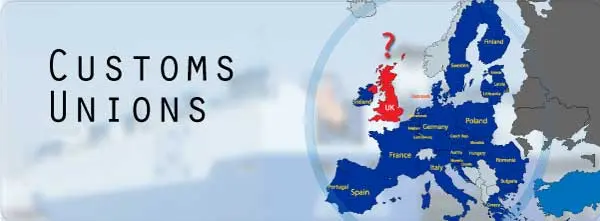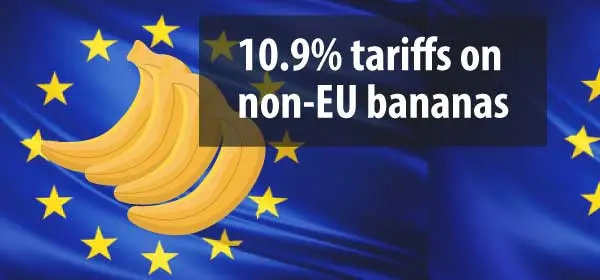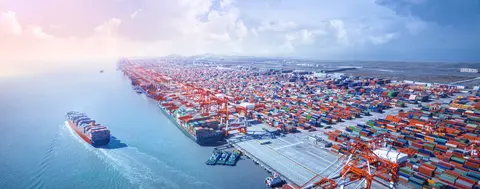
Customs unions
Customs unions

A customs union is a type of free trade agreement (FTA) which involves the removal of tariff barriers between members, together with the acceptance of a common (unified) external tariff (CET) against non-members.
Countries that export to other countries in the customs union only need to make a single payment (duty), once the goods have passed through the border. Once inside the union goods can move freely without additional tariffs. Tariff revenue may then be shared between members, with the possibility that the country that collects the duty retaining a share (between 20 and 25% in the European customs union) to cover the additional administration costs associated with border trade.
The advantages of a customs union
Increased trade flows
Like an FTA, the main positive effect of a customs union is that trade between members is likely to increase.
However, while the removal of trade barriers between members will encourage trade between them it is likely to reduce trade between members and non-members. How beneficial this is depends upon whether membership of a customs union increases or decreases the efficient allocation of scarce resources, and the satisfaction of the wants and needs of consumers and producers.
Trade creation vs trade diversion
The effect of a customs union is commonly explained in terms of trade creation and trade diversion. With trade creation, more efficient members can now sell more to less efficient (domestic) members. However, with trade diversion, more efficient non-members may now sell fewer goods to members, creating an opportunity for less efficient members to capitalise by selling more within the union.
Following the work of Jacob Viner, economists often start their analysis of customs unions by assessing whether the gains from trade creation outweigh the losses from trade diversion. If they do, then membership of a customs union will increase the welfare of member countries.
Solving the problem of trade deflection
One of the strongest arguments for a customs union (over a simple free-trade agreement) is that it solves the problem of trade deflection. Trade deflection occurs when non-members ship their goods to a low tariff FTA member (or set up a subsidiary in the low tariff country) and then re-ship to a high tariff FTA member. Hence, without a unified external tariff, trade flows would become distorted.
For example, assuming Europe operated a simple FTA, rather than a customs union, and if Germany imposes a high 40% tariff on Japanese cars, while France imposes just a 10% tariff, Japan would export its cars to French car dealers, and then re-sell them to Germany on a free-trade basis. This trade deflection is avoided if Germany and France (and others) form a customs union.
A common external tariff, along with ‘rules of origin‘, are likely to eliminate some of the problems that would occur with tariff differentials that may exist in a simple FTA.
This is precisely what the original six members of the European Economic Community (EEC) did when they formed a European Customs Union in 1968.
Closer integration and cooperation
Finally, the establishment of a customs union may pave the way for closer economic integration and political collaboration, including the formation of a single internal market, (common market) monetary union, and fiscal union. This is, of course, something which may generate as many new problems as it solves existing ones.
The disadvantages of a customs union
Loss of economic sovereignty
Members of a customs union are obliged to negotiate collectively with non-members, or organisations like the WTO, as a single group (bloc) of countries. While this is essential to maintain the customs union, it means that members are not free to negotiate individual trade deals in their own national interest.
For example, if a member wishes to support a declining industry, or protect an infant industry, it cannot do so through imposing its own tariffs, or other discriminatory trade policies. Equally, if it wishes to liberalise its trade, and open up to complete free trade, it cannot do so if a common tariff exists.
Also, it makes little sense for a particular member to impose a tariff on the import of a good that is not produced at all within that country.
 For example, the UK does not produce its own bananas, so a tariff on banana imports only raises price and does not protect domestic producers. The current EU tariff on bananas imported from outside the EU is 10.9%.
For example, the UK does not produce its own bananas, so a tariff on banana imports only raises price and does not protect domestic producers. The current EU tariff on bananas imported from outside the EU is 10.9%.
Allocation of tariff revenues
There is also a potential disadvantage to a single member in how the tariff revenue is allocated. Members who trade relatively more with countries outside the union, such as the UK, may not get their ‘fair share’ of tariff revenue.
Furthermore, the revenue retained by members who collect the initial revenue – between 20 and 25% in Europe – has been estimated to greatly exceed the atual collection costs of that revenue.
Complex tariff schedules, exceptions and ‘sensitive’ lists
A further problem associated with customs unions is that negotiations regarding the setting of common tariff levels can be very complex and costly, both in terms of time and the use of resources.
Inevitably there are exceptions and ‘sensitive’ products, where members find it difficult to relinquish control over a key resource. This leads to lengthy negotiations and trade offs – the greater the number of countries in a customs union, the lengthier the period of negotiation.
This problem is generally associated with customs unions between developing countries, though it has become relevant to likely Brexit negotiations. Exemptions for particular goods or countries may reintroduce the problem of trade deflection, which a customs union is designed to remove.
Brexit
The UK’s status as a customs union member is one of the dilemmas facing the UK as a result of Brexit. If the UK wishes to create individual trade deals with, say the USA, China and India, it cannot retain its current status as a full member of the European customs union. If the UK wishes to re-join the European Free Trade Area, (Iceland, Liechtenstein, Norway and Switzerland) then it may have to accept that a customs union essentially evolved to solve some of the fundamental problems associated with simple free trade areas.
See also:
Additional sources, other than those with links:


